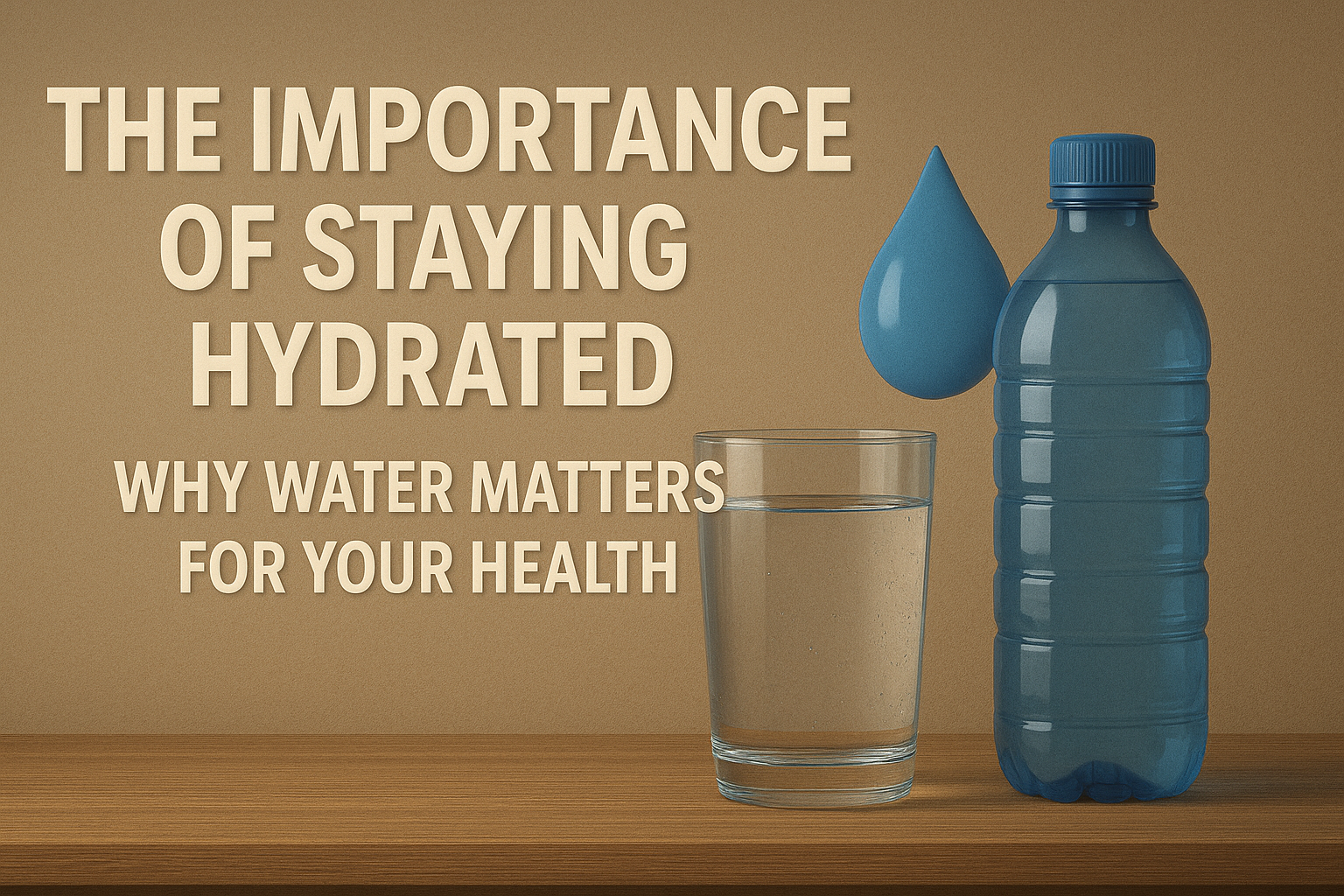The Importance of Staying Hydrated: Why Water Matters for Your Health
Water is one of the most essential elements for human life. Every organ, tissue, and cell in the body needs water to function properly. Yet many people unknowingly live in a state of mild dehydration, which leads to fatigue, headaches, dry skin, and poor mental focus. Staying hydrated is not just about drinking water—it’s about maintaining the right balance that keeps your body energized, healthy, and functioning at its best. In this detailed guide, we explore the importance of hydration, daily water needs, signs of dehydration, and practical tips to build healthy water-drinking habits.
Why Hydration Is Essential for Your Body
The human body is made up of nearly 60% water, which means water is the foundation of almost every process happening inside you. Proper hydration helps:
- Regulate body temperature through sweating and heat release
- Improve digestion and prevent constipation
- Transport nutrients and oxygen to cells
- Lubricate joints to prevent stiffness
- Support brain function and improve concentration
- Flush out toxins through urine and sweat
Without enough water, your body has to work harder, which leads to tiredness, stress, and poor overall health.
How Much Water Should You Drink Daily?
There is no single rule for everyone because water needs depend on age, climate, physical activity, and overall health. However, general health experts recommend:
- Men: 3–3.5 liters per day
- Women: 2–2.5 liters per day
- Active individuals: Add 0.5–1 liter extra depending on workouts
- Hot climate: Increase intake because the body loses more water
You don’t have to drink all water—fruits, vegetables, juices, and soups also contribute to hydration. But plain water should make up most of your daily intake.
Common Signs of Dehydration
Your body sends warning signs when it isn’t getting enough water. Some signs are mild, while others can become serious if ignored. Here are the most common symptoms:
- Dry mouth and throat
- Headaches or dizziness
- Dark yellow urine
- Low energy and fatigue
- Dry skin or chapped lips
- Muscle cramps
- Difficulty concentrating
If dehydration becomes severe, symptoms may include rapid heartbeat, confusion, or extremely dry skin. In such cases, medical attention is required.
Hydration and Brain Health
Your brain depends heavily on water to function efficiently. Even mild dehydration—just 1% loss of body water—can affect your mood, memory, and alertness. Studies show that proper hydration improves:
- Focus and mental clarity
- Short-term memory
- Reaction time
- Overall mood
That’s why staying hydrated is especially important for students, office workers, and anyone who spends long hours thinking or working on screens.
Hydration and Weight Management
Water can play a powerful role in maintaining a healthy weight. Many times, people confuse thirst with hunger, leading to overeating. Drinking enough water helps:
- Reduce cravings
- Improve metabolism
- Aid digestion
- Boost fat-burning processes
Drinking a glass of water before meals can naturally reduce calorie intake and support weight loss goals.
Best Ways to Stay Hydrated Throughout the Day
Building a hydration habit is simple if you follow a few easy steps:
1. Start Your Day with Water
Drink one glass of water as soon as you wake up. It activates your metabolism and hydrates your body after a long night of rest.
2. Carry a Water Bottle Everywhere
Keeping a bottle with you reminds you to drink regularly, especially if you’re busy or forget easily.
3. Eat Water-Rich Foods
Include foods like watermelon, cucumber, oranges, lettuce, and tomatoes. They naturally improve hydration.
4. Set Water Alarms
Small reminders every 1–2 hours can help you stay consistent.
5. Drink Before You Feel Thirsty
Thirst is a late sign of dehydration—don’t wait for it.
6. Avoid Too Many Sugary Drinks
Sodas, packaged juices, and energy drinks can dehydrate instead of hydrate. Choose plain or lemon water instead.
7. Increase Intake During Heat or Workouts
Your body loses extra water while sweating, so replace it to stay balanced.
Final Thoughts
Bar Ba Rossa 101
DownloadHydration is one of the simplest and most powerful ways to improve your health. From increased energy and glowing skin to better digestion and mental focus, water plays a vital role in keeping your body strong and active. By building small daily habits, you can ensure your body stays hydrated and performs at its best. Start today by drinking a glass of water—and make hydration a lifelong health priority.
